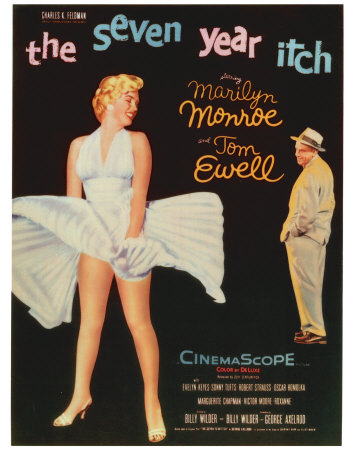
THE SEVEN YEAR ITCH
US, 1955, 105 minutes, Colour.
Marilyn Monroe, Tom Ewell, Evelyn Keyes, Sonny Tufts, Robert Strauss, Oscar Homolka, Marguerite Chapman
Directed by Billy Wilder
The Seven Year Itch was one of the most popular films of 1955. It is an archetypal Marilyn Monroe film – not only for the famous picture of her standing over the vent in the Manhattan street and her skirt lifting (imitated in so many films – and explored in theme in Insignificance, directed by Nicolas Roeg).
The film is very funny, was based on a play by George Axelrod who could write amusing screenplays, Bus Stop, Breakfast at Tiffany’s, How to Murder Your Wife as well as serious films like The Manchurian Candidate and The Fourth Protocol. Billy Wilder wrote the screenplay. He had begun in screenwriting after leaving Germany in the 1930s. He was to win Oscars as best director for The Lost Weekend and The Apartment. However, he is noted for his many comedies. He directed Marilyn Monroe in what is considered one of the best comedies of all time, Some Like It Hot.
Tom Ewell, who won a Golden Globe for his performance, is a reader for a publishing firm who stays in New York during the summer while his wife and son go to holiday camp. He resolves that there will be no experience of the seven year itch. However, Marilyn Monroe is upstairs, which leads to fantasy, to encounters – and his realisation that he loved his wife and missed her.
Excellent characterisations, amusing dialogue – and a nice moral to finish with.
1. The tone and humour of the title? Its meaning? The comic tone of the whole film, the introduction in the credits and the Indian prologue?
2. The value of the colour, widescreen, music, style and colourful approach to the film? Was this the right approach to this kind of comedy?
3. The film was based on a stage play. Was this evident? The confining of the sequences to the room? The small number of characters and their interplaying? The sharpness of the dialogue and the humour?
4. How successful a comedy was this? Was it a comedy to be laughed with? How satirical was it, how telling was the satire? What were its main targets?
5. Comment on the portrait of the typical American middle-aged male? Ageing, getting fatter, tired in his job, the 'itch', prone to fantasy, dreams, unable to cope with reality, avoiding reality. The enjoyable parallel with the Indians and their holiday and 'seven year itch'?
6. How well was the character of Richard Sherman portrayed? Tom Ewell's comic style? What kind of character was he? His deadpan style, talk and comment? His relationship with his wife and boy, seeing them off for the holidays, remembering them, telephoning, sending the canoe etc.? The satire on his job and the irony of sensationalising books? His relationship with his secretary - in fact and fantasy? His good resolutions and the inevitability of his not keeping them? His fantasies about romance? The real confrontation with the girl? The nature of his fantasies with her compared with the reality? The guilty fantasies of imagining his wife? The guilty fantasies of the girl announcing the truth over television? What had he learnt by his experience with the girl? A leering man forced to morality? How moralizing was the tone of this film? What attitude did it take towards double standards?
7. How important was the impact of the girl? As played by Marilyn Monroe? Her charm and comic flair? Her naivety and freshness? Why was she so likeable? As a typical American girl or not? Her glamour, her ironic comments on classical music etc.? Piano playing, champagne, sympathy for the 'Creature from the Black Lagoon', the film and Richard Sherman's fantasies about her?
8. The function of Tom Mc Kenzie in the film? As a comic character? As a romantic foil for Helen? For the aggression of Richard Sherman and his fantasies of aggression?
9. How amusing was the character of the doctor? His psychology and the explanation? Giving psychological jargon and fashion to explain and make an impact about the seven year itch? The comic scene about psychiatry?
10. How humorous were the scenes with the plumber and the irony of the seven year itch? Appearances being worse than reality?
11. The intermittent comedy and the touches, for instance, the waitress and her appeal for the nudist colony? What did these touches add to the film?
12. How effective was this kind of satire? How sharp is American satire? Could it be sharper?
13. What values in the audience were presupposed by this film? Did the film play to the values or did it challenge them? What morality stances did it presuppose? Was it clear or did it endorse some kind of double standards? In this sense was the comedy a type of light morality fable?